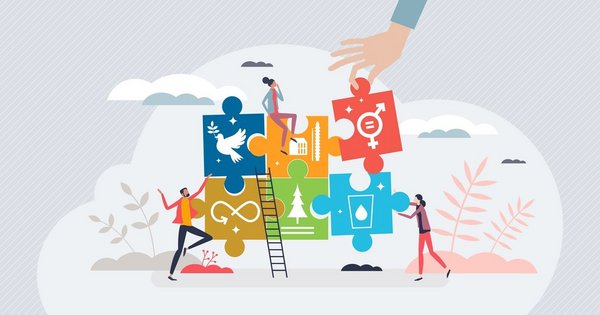 Read this article in French
Read this article in French- Share this article
- Subscribe to our newsletter
A boost for the SDGs in international cooperation
The 2030 Agenda, with its five principles and 17 Sustainable Development Goals (SDGs), has guided international efforts since 2015. At half-time for the SDGs, Julia Iversen, Head of the Competence Centre for Democracy, Digital Governance and Cities, and coordinator for work on the 2030 Agenda at Deutsche Gesellschaft für internationale Zusammenarbeit (GIZ) GmbH, explains where we stand and what this means for international cooperation.
Together with the Paris Agreement, the 2030 Agenda provides the framework for German development cooperation. A good seven years have passed since then, and from today’s perspective, we can safely say that the system of goals has proven its worth. The SDGs are highly visible, with an influence that extends well beyond development cooperation. Indeed, they provide guidance for organisations, enterprises and institutions of all kinds across the globe.
Getting the entire world to commit to this common agenda back in 2015 can be viewed as a tremendous achievement. Ultimately, it is nothing less than a plan for transforming and sustainably restructuring our planet and our societies – towards greater justice, sustainability and prosperity.
However, we are too far away from achieving the goals, and there is still too much work to be done. Based on current trends, only a small part of the 17 SDGs will be met by 2030. Sufficient data is available for around 140 targets, of which only 12 per cent are on the right track, while around 30 per cent are currently heading in the wrong direction.
Progress held up by crises and fragility
There are many reasons for this. The coronavirus pandemic has had a major impact, although other factors – Russia’s war of aggression against Ukraine and the related food insecurity, climate change, biodiversity loss and increasing fragility – are also hampering work on the SDGs.
Interactions between these crises and measures to implement the 2030 Agenda, and between individual SDGs, are the subject of extensive research. This has shown that some of the SDGs can have a particularly strong leverage effect. Take the quality of governance, for example. Inclusive, participatory, accountable and transparent institutions – as described in SDG 16 – have a positive impact on all the other SDGs.
That includes SDG 5 on gender equality, because achieving equality for marginalised groups also delivers positive development results overall. The same applies to SDG 17 on financing and partnerships, because the question of sufficient funding, including domestic revenues and private-sector money, will be vital to further progress on the SDGs. At the same time, it is important to harness the potential of digitalisation so that it can act as a catalyst.
How the 2030 Agenda plays a crucial role at GIZ
The 2030 Agenda also guides our work at GIZ. In the last seven years, for example, we have made significant efforts to apply the ‘Leave no one behind’ principle more systematically in our projects. Furthermore, in many of our projects, we work across sectors, taking into account positive and negative interactions between the strategy dimensions of different SDGs.
Our project concepts are aligned with the SDGs, too; we identify precisely which of the 17 Goals – usually there are several – they contribute to. We also implement the 2030 Implementation Initiative on behalf of the Federal Ministry for Economic Cooperation and Development (BMZ). This has a special position within the international donor landscape, as it addresses systemic challenges faced by partner countries in their efforts to implement the 2030 Agenda.
A unique programme
Our work covers three specific areas: strategy, financing and review – these are particularly important aspects for structural change and transformative approaches. In Madagascar, for example, we are supporting municipalities in improving their financial management systems, to ensure that they have more financial resources available and can use them in a more targeted way to reduce poverty. On average, budgets have now increased by a third.
Mexico has adopted one of the world’s first national strategies to implement the 2030 Agenda and has established a National Sustainable Development Council. Myanmar, Cambodia and Kenya have started to refine their statistical systems so that they can measure SDG indicators reliably.
Through the Initiative programme, which has a total funding volume of nearly 100 million euros, we are now supporting 32 partner countries and three regional organisations in implementing the 2030 Agenda. This is unprecedented.
Renewed commitment, stronger engagement
Just recently, UN Secretary-General António Guterres called for 500 billion dollars per year as an ‘SDG stimulus’. This figure clearly shows that Guterres still sees big hurdles to making greater progress on the SDGs by 2030. GIZ, too, will not cease its efforts in the remaining seven years and will do its utmost to advance work on the 2030 Agenda, because a significant joint effort from the global community is still needed in order to achieve the Goals.
(giz akzente/wi)





Add a comment
Be the First to Comment